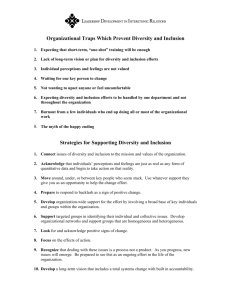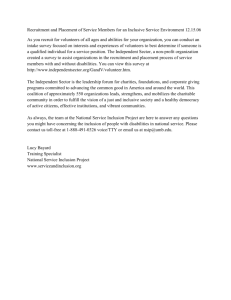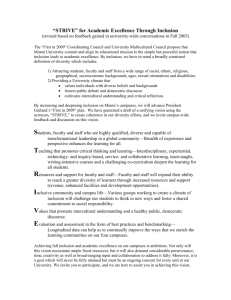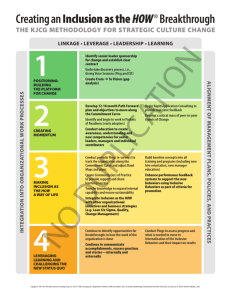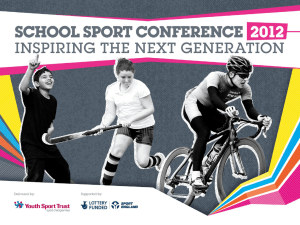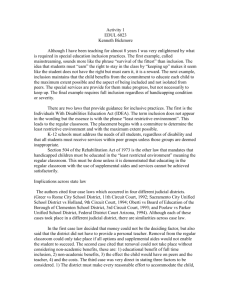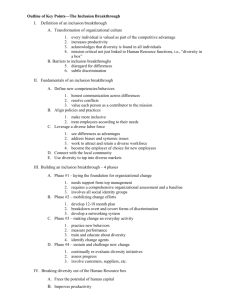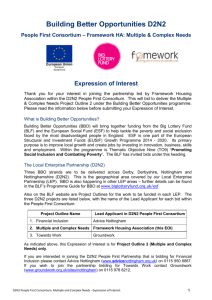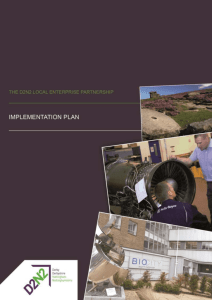BBO Application Summary
advertisement
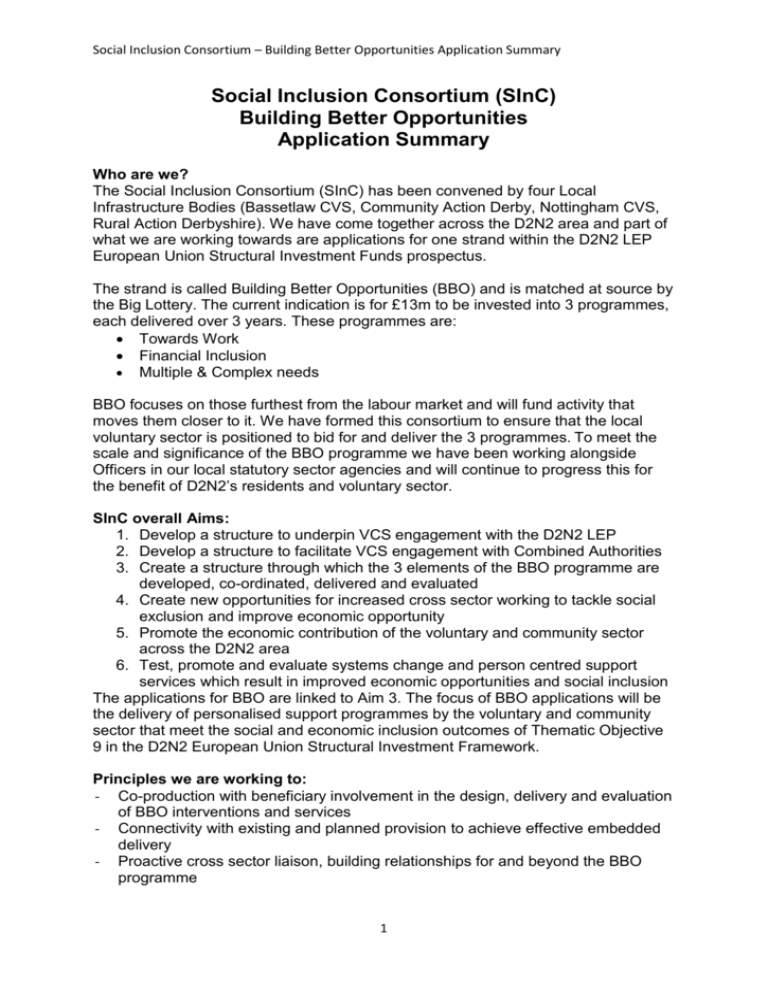
Social Inclusion Consortium – Building Better Opportunities Application Summary Social Inclusion Consortium (SInC) Building Better Opportunities Application Summary Who are we? The Social Inclusion Consortium (SInC) has been convened by four Local Infrastructure Bodies (Bassetlaw CVS, Community Action Derby, Nottingham CVS, Rural Action Derbyshire). We have come together across the D2N2 area and part of what we are working towards are applications for one strand within the D2N2 LEP European Union Structural Investment Funds prospectus. The strand is called Building Better Opportunities (BBO) and is matched at source by the Big Lottery. The current indication is for £13m to be invested into 3 programmes, each delivered over 3 years. These programmes are: Towards Work Financial Inclusion Multiple & Complex needs BBO focuses on those furthest from the labour market and will fund activity that moves them closer to it. We have formed this consortium to ensure that the local voluntary sector is positioned to bid for and deliver the 3 programmes. To meet the scale and significance of the BBO programme we have been working alongside Officers in our local statutory sector agencies and will continue to progress this for the benefit of D2N2’s residents and voluntary sector. SInC overall Aims: 1. Develop a structure to underpin VCS engagement with the D2N2 LEP 2. Develop a structure to facilitate VCS engagement with Combined Authorities 3. Create a structure through which the 3 elements of the BBO programme are developed, co-ordinated, delivered and evaluated 4. Create new opportunities for increased cross sector working to tackle social exclusion and improve economic opportunity 5. Promote the economic contribution of the voluntary and community sector across the D2N2 area 6. Test, promote and evaluate systems change and person centred support services which result in improved economic opportunities and social inclusion The applications for BBO are linked to Aim 3. The focus of BBO applications will be the delivery of personalised support programmes by the voluntary and community sector that meet the social and economic inclusion outcomes of Thematic Objective 9 in the D2N2 European Union Structural Investment Framework. Principles we are working to: - Co-production with beneficiary involvement in the design, delivery and evaluation of BBO interventions and services - Connectivity with existing and planned provision to achieve effective embedded delivery - Proactive cross sector liaison, building relationships for and beyond the BBO programme 1 Social Inclusion Consortium – Building Better Opportunities Application Summary - Person centred services tackling complex social exclusion issues delivered by local agencies that have a pre-existing relationship with eligible beneficiaries Social innovation through system change and voluntary sector responsiveness Integration of Social Value in the design and delivery of initiatives/services and work towards an agreed set of Social Value indicators to embed in commissioning principles Charter for membership The members of the Social Inclusion Consortium Core Group commit to: Facilitating and overviewing a structure and process that is built on layers of co-production Co-ordination of voluntary sector engagement and delivery within the Building Better Opportunities Programme Convening the optimum structure to increase the voluntary sector’s access to social inclusion funding The Social Inclusion Consortium Strategic Partners commit to: Promotion of the Consortium as a voluntary sector led structure Open dialogue across the consortium membership to tackle systemic, structural and geographical social exclusion Support t of the delivery of the Building Better Opportunities programme in practical ways The Social Inclusion Consortium Delivery Partners commit to: Delivery of initiatives/services that are designed through co-production with beneficiaries and which meet all the BBO eligibility criteria Collaboration and co-operation across the D2N2 area, acting as the catalyst for social innovation and the achievement of positive social and economic outcomes for programme participants Collection and submission of all information required to meet the Lead Accountable Body’s legal and contractual compliance The Lead Accountable Body/Lead Applicant commits to: Accept the role on behalf of communities and beneficiaries across the geography of D2N2 Develop and deliver the BBO Partnership Agreement in line with the Social Inclusion Consortium, Big Lottery Fund and the D2N2 Social Inclusion Framework’s plans, structures and processes Deliver the role in line with legal requirements whilst remaining flexible to the local aspects of delivery and contract compliance Applying to become a Social Inclusion Consortium Delivery Partner The background reading for all aspects of Building Better Opportunities can be found here www.oneeastmidlands.org.uk/Building_Better_Opportunities An Expression of Interest for each programme within Building Better Opportunities needs to be submitted to the Big Lottery Fund by midday on Monday 3rd August 2015. The Social Inclusion Consortium is now inviting potential Delivery Partners to complete our application form. If your application to us is successful, you will be 2 Social Inclusion Consortium – Building Better Opportunities Application Summary named in the relevant Expression of Interest that is submitted by the relevant Social Inclusion Consortium Lead Applicant Organisation. You will know whether or not you are successful and included in the relevant Expression of Interest week commencing 20th July. If these Expressions of Interest are approved, the next phase is to complete a Stage 2 Application (expected deadline November 2015). Making an Application to the Social Inclusion Consortium We have designed an online application form that potential Delivery Partners need to complete and submit by 5pm on Friday 26th June. In the application form we ask for information on: 1) Your participants – we ask for this because the programmes must be underpinned by beneficiary involvement and co-production 2) Your proposal for personalised interventions – we ask for this because your application needs to meet identified gaps and meet the EU eligibility criteria 3) Your commitment to the Social Inclusion Consortium – we ask this because our approach is to build a platform for sustained voluntary sector engagement with decision makers and to support system change. This goes beyond a commitment to merely deliver a range of activities to achieve agreed outcomes 4) Your organisation and Due Diligence – we ask for this because providers of activities funded by EU/Big Lottery Fund have to meet certain criteria If you are successful with your application to the Social Inclusion Consortium and we are successful with our applications to the Big Lottery Fund there will be a series of additional questions we need to ask between September and November 2015. This information will be included in the Second Stage Application to the Big Lottery Fund. The Assessment Phase Once you have submitted your application to the Social Inclusion Consortium it will be appraised by an Applications Panel. There will be three Applications Panels, one for each of the BBO programmes. The decision of the Applications Panels will be communicated to you week commencing 20th July. Below are the summaries of the BBO Project Outlines as published by the Big Lottery Fund, which you will need to refer to throughout your application. Building Better Opportunities – Project Outlines Project 1 Financial Inclusion - £3,088,500 March/Aug 2016 to Dec 2019 The specific activities to be delivered through this project should be determined by applicants and clearly articulated in the stage one application form, but possible activities could include: support delivered through outreach delivery; one to one support; group-based support. Successful delivery of this project may require expertise in financial products and services. All activities should be demand-driven and take a personalised approach. Best practice indicates that participant involvement in designing projects and 3 Social Inclusion Consortium – Building Better Opportunities Application Summary influencing the support they receive is the most effective approach, and applicants are therefore encouraged to demonstrate how they will employ this within their project. People with mental health challenges may be more likely to become unemployed and need stable finances to become work ready. Applicants should ensure that the project includes appropriate accessible materials and connections with mental health services. Applicants are encouraged to be explicit on measures to address mental health challenges; approximately two per cent of outputs should be to support people with mental health challenges. Consideration should be given to demonstrating how the project is aligned to the D2N2 Strategy Principles and the D2N2 Delivery Criteria for Social Inclusion (Impact and Scale; Delivery Readiness; Additionality; Local Intelligence and Capacity; Quality; Performance and Efficiency; Co-ordination of Market Engagement, and Flexibility and Responsiveness). Applicants are encouraged to consider a wide range of innovative delivery models. All participants must be unemployed or economically inactive as defined in our programme guide. The project will have a specific focus on those people within the D2N2 LEP area who are out of work, furthest from the labour market and people who are most at risk of social exclusion. The Social Inclusion Framework places a strong emphasis on the need to address issues of mental health as a barrier to inclusion. It is also vital that applicants can demonstrate working relationships with mental health support services (in order to ensure awareness of the availability of financial support) and that any tools and resources produced are accessible to this particular client group. Whilst we can support activities for young people between the ages of 15 and 18, there is a new statutory requirement for this age group to remain in education, employment or training. We can only pay for activities working with young people who are aged 16–29 and who are not in education, employment or training (NEET) and young people aged 15-18 who are NEET or at risk of becoming NEET. Young people below the age of 15 are ineligible participants. Unless the project is specifically aimed at young people, those aged 29+ remain eligible participants. The project must deliver the following outputs and results within its lifetime: At least 1950 people are engaged in activities to improve their work readiness, including at least: 1317 men; 633 women; 975 people who are unemployed; 975 people who are economically inactive; 309 people who are 50 or older; 397 people with disabilities; 238 people from ethnic minorities. 4 Social Inclusion Consortium – Building Better Opportunities Application Summary N.B. each person can be counted against more than one category. At least 253 people enrolled on the project move into education or training on leaving. At least 263 people who were economically inactive when joining the project move into employment (including self-employment) or job-search on leaving. At least 126 people who need access to childcare receive childcare support Project 2 Towards Work Programme - £7,401,700 March/Aug 2016 to Dec 2019 The project will need to: engage and support disadvantaged people to enable them to overcome barriers to employment; provide bespoke, wrap around support aimed at getting people who are out of work and people who are most at risk of social exclusion back into or towards work, employability provide intensive engagement and support ahead of engagement in learning or work; provide lighter-touch support as and when people are accessing provision and services from other providers, particularly where this is short term. The specific activities to be delivered through this project should be determined by applicants and clearly articulated in the stage one application form, but possible activities could include: supporting opportunities to identify existing skills and interests; building confidence and effective communication skills; developing a sense of self confidence; provision of effective information advice and guidance to enable participants to understand and develop their future learning and work options and pathways; supporting participants to access other services (including statutory) where these would address wider barriers to employment The provision for young people must be aligned with other D2N2 ESF-funded youth engagement programmes. It should assess each young person and signpost them on to other provision as necessary, in line with their specific needs. All activities should be demand driven and take a personalised approach. Best practice indicates that participant involvement in designing projects and influencing the support they receive is the most effective approach, and applicants are therefore encouraged to demonstrate how they will employ this within their project. Applicants should demonstrate how their project is aligned to the D2N2 Strategy Principles and the D2N2 Delivery Criteria for Social Inclusion (Impact and Scale; Delivery Readiness; Additionality; Local Intelligence and Capacity; Quality; 5 Social Inclusion Consortium – Building Better Opportunities Application Summary Performance and Efficiency; Co-ordination of Market Engagement, and Flexibility and Responsiveness). Applicants are encouraged to consider a wide range of innovative delivery models All participants must be unemployed or economically inactive as defined in our programme guide. The project will have a specific focus on people within the D2N2 LEP area who are out of work, furthest from the labour market and people who are most at risk of social exclusion. This includes 80 per cent of the funding to support the below groups: older long-term unemployed people (40+); women returning to or needing to access employment; younger people (aged up to 24, including NEETs). Applicants are encouraged to be explicit on measures to address mental health challenges that present a barrier to employment; approximately 20 per cent of outputs should be to support people with mental health challenges. Whilst we can support activities for young people between the ages of 15 and 18, there is a new statutory requirement for this age group to remain in education, employment or training. We can only pay for activities working with young people who are aged 16–29 and who are not in education, employment or training (NEET) and young people aged 15-18 who are NEET or at risk of becoming NEET. Young people below the age of 15 are ineligible participants. Unless the project is specifically aimed at young people, those aged 29+ remain eligible participants. The project must deliver the following outputs and results within its lifetime: At least 1,625 people are engaged in activities to improve their work readiness, including at least: 1,105 men; 520 women; 812 people who are unemployed; 813 people who are economically inactive; 260 people who are 50 or older; 325 people with disabilities; 195 people from ethnic minorities. N.B. each person can be counted against more than one category. At least 189 people enrolled on the project move into education or training on leaving. At least 356 people move into employment, including self-employment, on leaving. At least 196 people who were economically inactive when joining the project move into employment (including self-employment) or job-search on leaving. At least 94 people who need access to childcare receive childcare support. 6 Social Inclusion Consortium – Building Better Opportunities Application Summary Project 3 Multiple and Complex Needs - £4,634,800 March/Aug 2016 to Dec 2019 The project will need to: provide the means through which disadvantaged people become work-ready, and are able to access learning, training and job opportunities; engage and support disadvantaged people to enable them to overcome barriers to employment; be responsive to the needs of individuals and communities; provide consistent levels of support across urban and rural areas. The specific activities to be delivered through this project should be determined by applicants and clearly articulated in the stage one application form, but possible activities could include: helping individuals to gain a greater understanding of their own abilities and learning needs and to build confidence; supporting joint working with existing provision, such as the troubled families teams and local transport leads; provision of small group support in rurally isolated areas; support to re-engage with and access mainstream services beyond those directly related to employability. Applicants are encouraged to be explicit on measures to address mental health challenges; approximately 13 per cent of outputs should be to support people with mental health challenges. They should also demonstrate how their delivery offer will align with the strategic programme currently active within Nottingham City. Consideration should be given to demonstrating how the project is aligned to the D2N2 Strategy Principles and the D2N2 Delivery Criteria for Social Inclusion (Impact and Scale; Delivery Readiness; Additionality; Local Intelligence and Capacity; Quality; Performance and Efficiency; Co-ordination of Market Engagement, and Flexibility and Responsiveness). Applicants are encouraged to consider a wide range of innovative delivery models. All participants must be unemployed or economically inactive as defined in our programme guide. The project will have a specific focus on people within the D2N2 LEP area who are out of work, furthest from the labour market and people who are most at risk of social exclusion. It should be focused on people with multiple and complex needs. Whilst we can support activities for young people between the ages of 15 and 18, there is a new statutory requirement for this age group to remain in education, employment or training. We can only pay for activities working with young people who are aged 16–29 and who are not in education, employment or training (NEET) and young people aged 15-18 who are NEET or at risk of becoming NEET. Young people below the age of 15 are ineligible participants. Unless the project is specifically aimed at young people, those aged 29+ remain eligible participants. The project must deliver the following outputs and results within its lifetime: 7 Social Inclusion Consortium – Building Better Opportunities Application Summary At least 421 people are engaged in activities to improve their work readiness, including at least: 284 men; 137 women; 210 people who are unemployed; 211 people who are economically inactive; 67 people who are 50 or older; 86 people with disabilities; 51 people from ethnic minorities. N.B. each person can be counted against more than one category. At least 55 people enrolled on the project move into education or training on leaving. At least 42 people move into employment, including self-employment, on leaving. At least 57 people who were economically inactive when joining the project move into employment (including self-employment) or job-search on leaving. At least 27 people who need access to childcare receive childcare support. 8 Social Inclusion Consortium – Building Better Opportunities Application Summary 9

